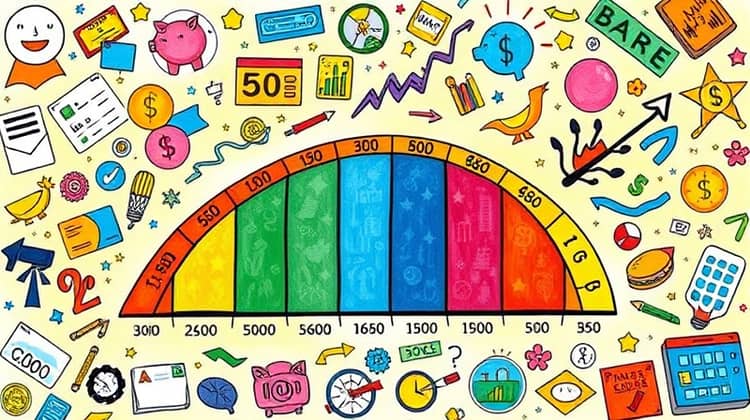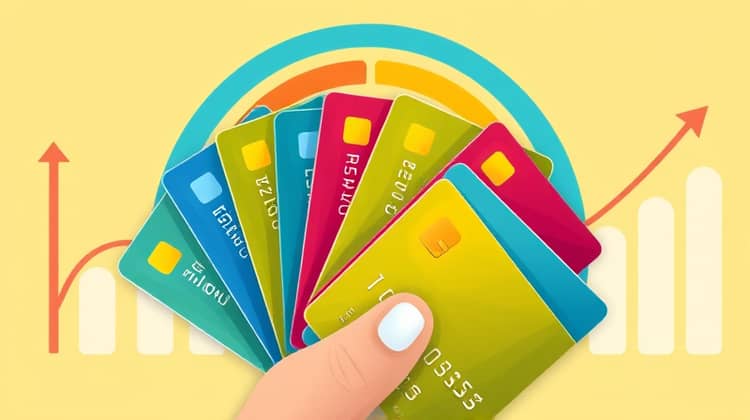Managing your finances wisely is essential for financial health, and one of the critical aspects of that is understanding how credit scores work. A credit score is a three-digit number that assesses your creditworthiness, influencing your ability to secure loans or credit. Among various factors that affect this score, credit cards play a significant role.
In today's financial landscape, credit cards are not just a payment tool; they are also an essential component of your overall credit profile. Many people use credit cards for convenience, but few realize that how they manage these cards can have lasting repercussions on their credit scores.
Understanding the relationship between credit cards and credit scores can help consumers make informed financial decisions. This guide will explore how credit cards can affect your credit score positively and negatively, as well as provide useful tips for managing your credit cards effectively.
Understanding Credit Scores

A credit score is broadly defined as a numerical representation of your creditworthiness, typically ranging from 300 to 850. Higher scores indicate a greater likelihood that a borrower will repay debts on time, while lower scores can signify financial risk.
Lenders use credit scores as one of the main criteria when deciding whether to extend credit, and at what interest rates. This score is influenced by several factors, including payment history, types of credit in use, length of credit history, amounts owed, and new credit inquiries.
The most commonly used credit scores are the FICO score and the VantageScore. Both scoring models weigh factors differently, but an essential consensus is that responsible management of credit accounts will reflect positively on your score.
Understanding your credit score takes time and effort, but it pays off in obtaining favorable credit terms and lower interest rates. It is vital to check your score regularly to ensure it is accurate and to catch any mistakes or fraudulent activity early.
- Payment history (35%): Timely payments positively impact your score.
- Credit utilization (30%): Keeping your balance low relative to your limit matters.
- Length of credit history (15%): Older accounts can enhance your score.
- Credit mix (10%): A diverse range of credit types can be beneficial.
- New credit inquiries (10%): Too many inquiries can negatively affect your score.
Being aware of these scoring factors can help you make better financial decisions. For instance, paying your credit card bills on time and keeping your utilization ratio low are crucial practices for maintaining a healthy credit score.
The Role of Credit Cards in Credit Scoring

Credit cards can significantly influence your credit score, as they are often a large part of how lenders assess creditworthiness. A large portion of your credit score is based on your credit utilization ratio, which refers to the amount of credit you're currently using compared to your total available credit.
For example, if your total credit limit across all cards is $10,000, and you have a balance of $2,000, your credit utilization ratio is 20%. Most financial experts recommend keeping this ratio below 30% to avoid negative impacts on your score.
- Credit cards provide a credit history that can improve your score over time.
- Using credit responsibly can demonstrate reliability to lenders.
- Credit inquiries from card applications can temporarily lower your score.
- High balances can lead to increased credit utilization, impacting your score.
Ultimately, the management of your credit card plays a crucial role in shaping your credit score. Understanding how these cards fit into the bigger picture of credit scoring helps you to use them effectively.
Positive Impacts of Credit Cards on Credit Scores

When used wisely, credit cards can serve as a powerful tool for building and improving your credit score. A primary benefit is that they help establish a solid credit history, which accounts for a significant portion of your credit score.
- Consistent on-time payments enhance your payment history.
- A lower credit utilization ratio improves your utilization rate.
- Credit cards can help you diversify your credit mix, positively affecting your score.
- Having a longer credit history from your oldest cards can boost your score.
The key to harnessing the positive impact of credit cards is responsible usage and timely payments, which can lead to a higher credit score over time.
Negative Impacts of Credit Cards on Credit Scores

While credit cards can help improve your credit score, they can also have negative effects if not managed correctly. A significant factor that can harm your score is high credit utilization – exceeding the recommended 30% ratio may trigger warning signs for lenders.
- Late payments can severely damage your payment history.
- Maxing out credit cards can inflate your credit utilization ratio.
- Frequent new applications for credit cards can lower your score due to hard inquiries.
- Closing old accounts can shorten your credit history.
It is crucial to be aware of these potential pitfalls to avoid any detrimental effects on your credit score.
Managing Credit Cards for Optimal Credit Scores

To ensure that credit cards have a positive impact on your credit score, adopting effective management strategies is essential. First and foremost, always aim to pay your balance in full by the due date to avoid late fees and interest charges.
Additionally, monitoring your credit utilization ratio is vital. Keeping your credit utilization below 30% will paint a favorable picture on your credit report, while also allowing you to better manage your finances.
- Set up payment reminders to avoid missing due dates.
- Regularly check your credit report for accuracy.
- Keep old accounts open to maintain a longer credit history.
- Limit new credit requests to avoid excessive inquiries.
Understanding how your credit cards influence your credit score enables you to use them responsibly and effectively. By following these practices, you can safeguard your financial health and enjoy the advantages that come with having a good credit score for future borrowing needs.














